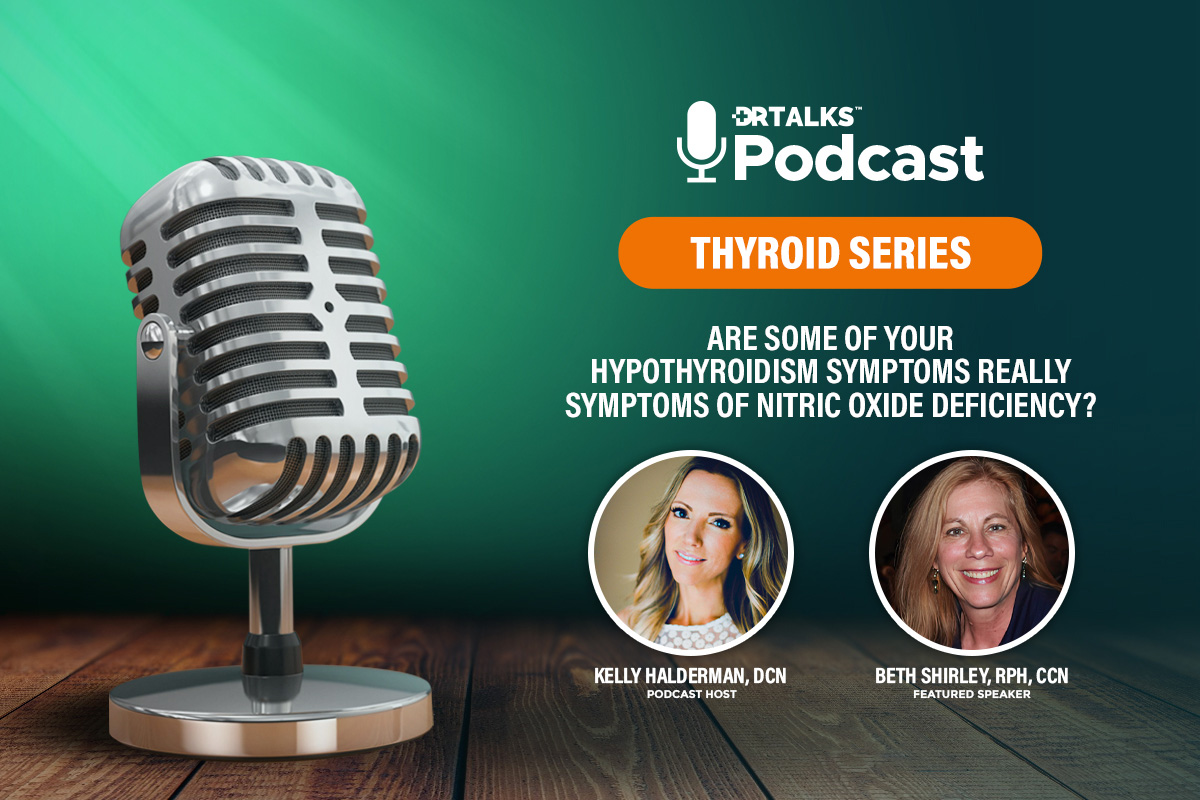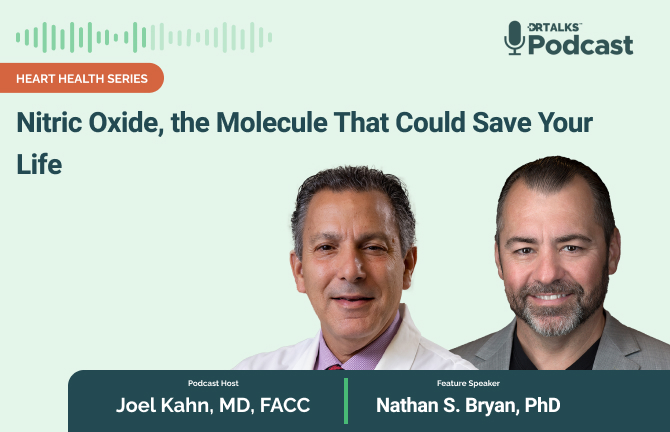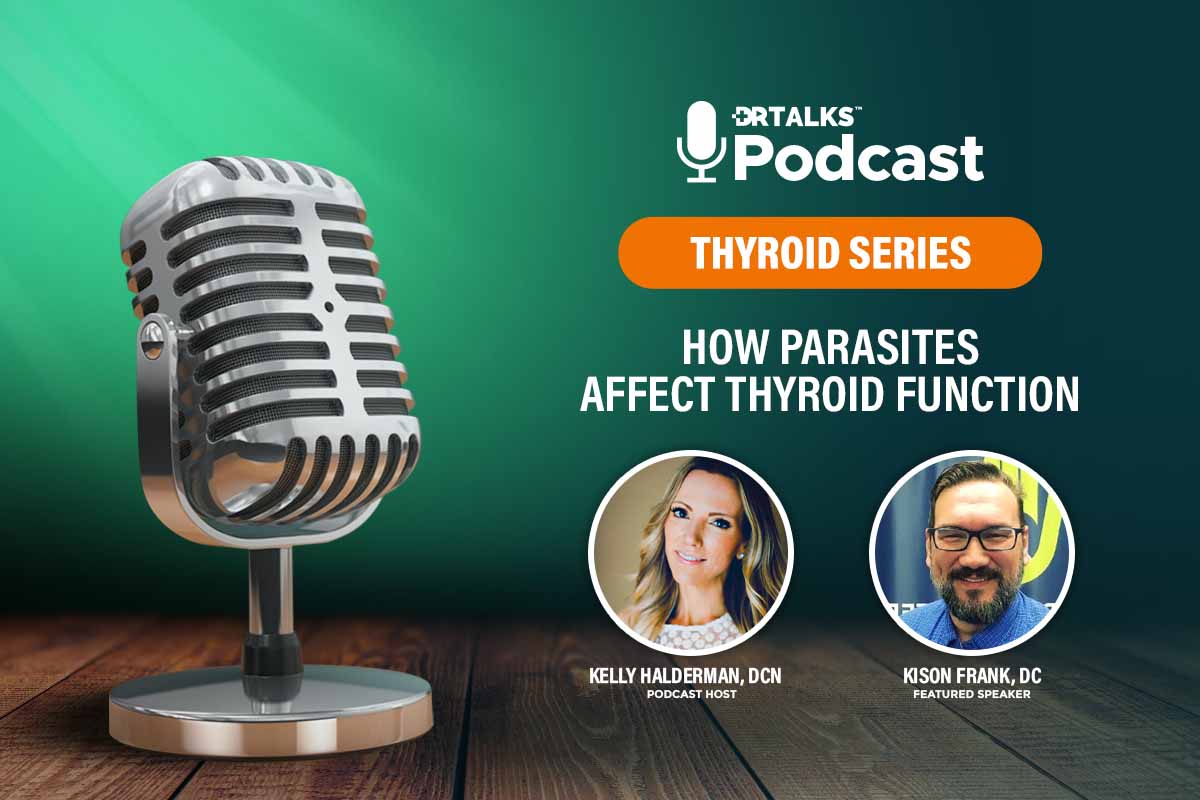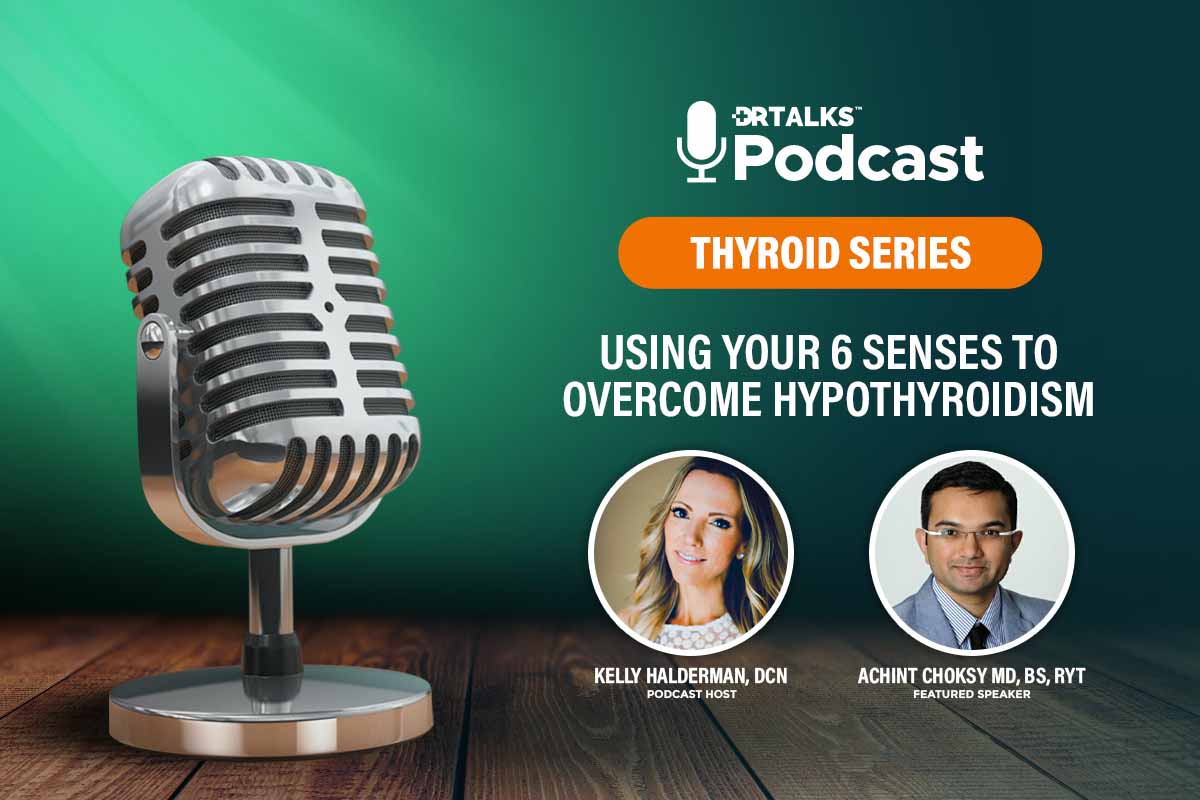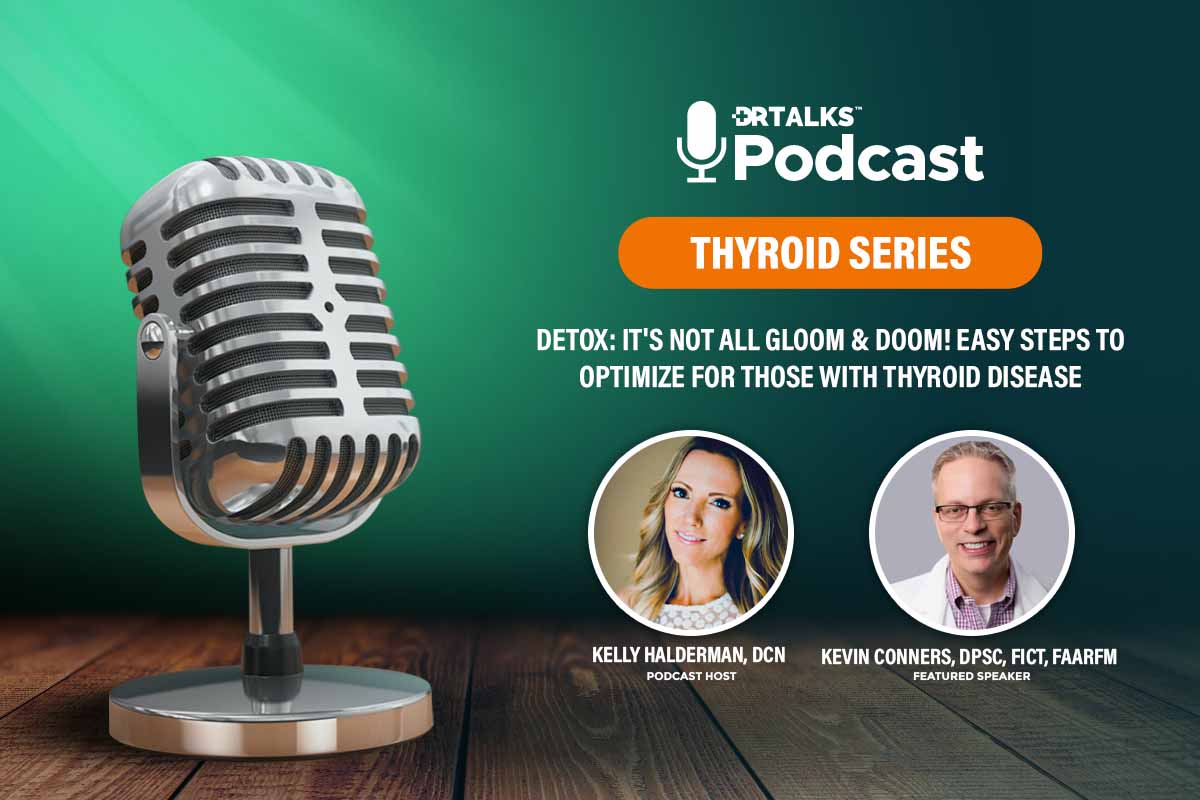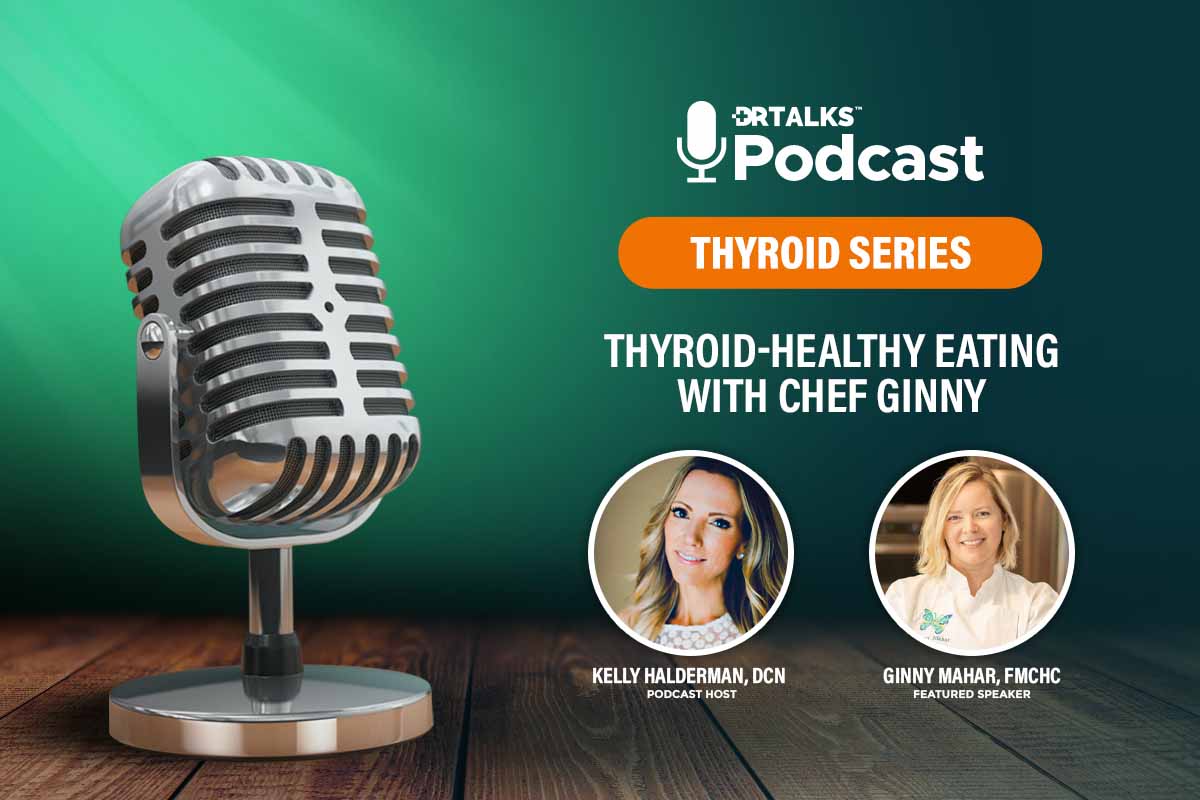Join the discussion below

Dr. Kelly Halderman is a former physician turned biotech expert. She currently serves as Chief Health Officer for Weo - a health-conscious biotech company that uses patented technology to transform and perfect the most precious molecule on the planet, water. Weo is known today as the world’s global leader in... Read More
- The podcast features Dr. Kelly Halderman interviewing Beth Shirley, RPh, CCN, a pharmacist and certified clinical nutritionist, about the crucial role of nitric oxide in thyroid health
- Beth Shirley explains that nitric oxide is a molecule that governs circulation and microcirculation, influencing physiological processes in every cell. A deficiency in nitric oxide can lead to issues like hypertension, diabetes, insulin resistance, cognitive impairment, and erectile dysfunction
- Factors contributing to nitric oxide deficiency include age (after 40), stress, poor diet devoid of nitrate-rich vegetables, environmental toxins, medications like antibiotics and birth control, and certain genetic factors
- Strategies to support nitric oxide production include consuming nitrate-rich foods like arugula, addressing stress, optimizing adrenals, using nitrate-based supplements, and ensuring proper levels of co-factors such as vitamin C and tetrahydrobiopterin (BH4) to recouple the nitric oxide-producing enzyme. The discussion highlights the interconnectedness of nitric oxide with thyroid health and the broader impact of its deficiency
Related Topics
Age-related Decrease In Nitric Oxide Production, Arginine, Brain Function, Circulation, Cognitive Function, Cold Hands And Feet, Diabetes, Emf Pollution, Erectile Dysfunction, Genetic Snips, Glyphosate, Hypertension, Hypothyroidism, Insulin Resistance, Medications, Microcirculation, Nadph Oxidase, Nitric Oxide Deficiency, Nitric Oxide Synthesis Pathway, Nitric Oxide Testing, Oxidative Stress, Oxygen Delivery, Poor Circulation, Stress, Thyroid Health, Thyroid Peroxidase, Uncoupling Of Nitric Oxide EnzymeDr. Kelly Halderman
Hi, I’m Dr. Kelly Halderman. I’m a former medical physician and author of the thyroid debacle. I’m now devoting my life to education, research and biotech because I realized we need educated people to bring us cutting edge information, especially when we find ourselves with a diagnosis such as hypothyroidism. When I was practicing al empathic medicine, I myself became very sick, bedridden with what would be diagnosed as Lyme and mold infections along my health journey. I was also diagnosed with Hashimoto’s thyroiditis, a condition I was told that could only be managed with medication. Well, I’m here to tell you that there is more than medication to help you as you will learn through my powerful interviews with several functional medicine practitioners. There are tools that will help empower you to take charge of your health. Join me today as I interview leading doctors naturopathic specialists to uncover the most useful health insights for you. This podcast has been launched in collaboration with DrTalks visit them today at DrTalks.com/calendar to learn more about their upcoming summits.
Hi everyone. This is Dr. Kelly. Welcome back to doctor talks where we’re continuing our series on thyroid health. Today we have a very special, very knowledgeable guest Beth Shirley. Welcome Beth.
Beth Shirley, RPh, CCN
Hi, how are you?
Dr. Kelly Halderman
Good, good. I’m so excited to have you on. You are a wealth of knowledge. And to start, let’s talk about your background. Let’s talk about the practice that you have right now and you know where you are currently?
Beth Shirley, RPh, CCN
Well I’m a pharmacist and a certified clinical nutritionist. So I went into pharmacy thinking I was gonna be helping people and after being in it for 20 years seeing people come back sicker and sicker on more and more drugs. In 1997 I became a CCN. So I became the pharmacist to go to if you wanted to get off drugs or not even go down that road to begin with. And so I’ve been helping people like nutritionally With their health. And in 2009 I became really interested in nitric oxide and started down that road because nitric oxide is a molecule that touches every single physiological process. So it’s the base of all healing.
Dr. Kelly Halderman
Okay. Yeah, that’s really interesting. I know that you’ve just skyrocketed in your depth and breadth of knowledge in nitric oxide. You might go to you are you are several, several high level doctors go to when discussing nitric oxide you put in the work. You do the research. You make the ties, you know, tell us about you know you told us about the molecule? Tell us a little bit more how it acts on the body. Like what would someone who has symptoms of low nitric oxide, What would they be experiencing and then go into the why gonna marry those together?
Beth Shirley, RPh, CCN
Okay well nitric oxide governed circulation and microcirculation. So microcirculation is where all the magic happens. That’s where all the exchange happens. The oxygen, glucose nutrients and just as importantly the debris to be carried away. So that’s how it touches every single physiological process. Every cell cannot be more than two cells away from a functioning micro capillary or there’s dysfunction in cellular death. So keeping those micro capillaries happy and functioning is the base of all healing.
Dr. Kelly Halderman
Okay. And so microcirculation I you know as a former physician think of think of circulation in terms of you know, heart disease, I think in terms of brain function, erectile dysfunction are those some kind of the top things red flags. People will notice as they start to have nitric oxide issues?
Beth Shirley, RPh, CCN
One of the first signs with men is actually erectile dysfunction. You see erectile dysfunction. You know, you’ve got dysfunction in those micro capillaries, but hypertension is one diabetes, insulin resistance not being able to heal The brain function cognition because our brains even though they’re like only 2% of our body weight, they require about 25% of our oxygen consumption. So that means those micro capillaries have to be open and be able to deliver that oxygen and the hemoglobin has to have electric oxide attached to it in order to be able to release that oxygen. So you could be super saturated with oxygen. And if you don’t have enough nitric oxide you cannot release that oxygen to the cells.
Dr. Kelly Halderman
Didn’t know that’s extremely relevant to the entire human body. So you said that there’s a lot of diseases that you just mentioned. Hypertension, diabetes or tell dysfunction that are ubiquitous. And so you look at all these disease processes that have that nitric oxide plays a role in. Why are we so nitric oxide deficient?
Beth Shirley, RPh, CCN
Our diets. Okay a standard American diet devoid of nitrate rich veggies and essential cofactors and nutrients age by the time we’re 40 our ability to make nitric oxide through that nose pathway. The nitric oxide synthesis pathway decreases to about 50%. By the time we’re 60 its only function about 15%. So that’s why it’s so critical to support that nitrate to nitrite to nitric oxide pathway. So drugs Antibiotics antidepressants, birth control pills. I mean that’s why they don’t like women over the age of 35 taking birth control pills and especially if you’re a smoker insects P. P. I. P. P. I. S. Interfere with the production of nitric oxide through both pathways. E. M. F. S. Were swimming in the sea of E. M. F. Pollution glyphosate genetic snips and not just your na snips like anything that increases oxidative stress, your S. O. D. Catalysts. Hft anything that interferes with the production of Bh four like your Q. D. P. R. D. HFR. If you have any M th fr snips you are by definition nitric oxide deficient and that’s about 40% of us. And the big one stress stress uncouple that knows enzyme stress. What I mean by uncoupling is nitric oxide. The nose enzyme is a dimer and that electron is handed down from N. A. D. P. H. Through your flab ins onto arginine to make nitric oxide when not when noses uncoupled and Bh four is what couples knows. It hands that electron down to oxygen and make super oxide. So an uncoupled Knauss becomes a super oxide generator, not a nitric oxide producer. And all of those things I talked about actually uncoupled gnaws.
Dr. Kelly Halderman
Okay definitely there’s a lot of everything that you just said. You know all those process from snips to stress. I mean we have it all and we have multiple things. So it’s not just one thing that’s uncoupling it and I think that I would love to just get your take on people taking arginine then talk about, oh I have low and I took oxide. I use one of those strips to test to see if I have low, I’m going to take arginine. Talk about that.
Beth Shirley, RPh, CCN
I’m not a fan of using arginine for anybody over the age of 40 or anybody with any chronic issues because you know their noses uncoupled arginine can go down multiple pathways. Not just the nose but you’re feeding somebody arginine and their noses uncouple it coupled. You’re actually increasing oxidative stress. You’re increasing the production of A. D. M. A. Which is connected to all cause mortality. You’re increasing ammonia, you’re increasing your ear. So. No I mean sitter line might be a little better than arginine because the cell will take up sertraline to make its own argentine to feed the nose. But you’re still trying to make a dysfunctional uncoupled nose work and it’s just not going to. Okay so most of the tests that the studies that have done using arginine to increase nitric oxide were done on young fit male athletes whose nose is coupled.
Dr. Kelly Halderman
They’re definitely not uncoupled. Okay very good. I wanted to get the opinion from the expert on that one. So let’s move on to N. A. D. P. H. Oxidase. What is that? And let’s tighten the thyroid health because that’s the underlying topic of this series thyroid health.
Beth Shirley, RPh, CCN
Right Well N. A. D. P. H. Oxidase is one of our enzymes whose only job is to make super oxide. And so it is used to um to like for an antimicrobial. However this enzyme gets up regulated by numerous environmental factors like mold oscillates chronic inflammation up regulates it stress. Almost 16 like E. M. F. That’s how E. M. F. Causes the damage it up regulates this N. A. D. P. H. Oxidase which increases oxidative stress. However when this N. A. D. P. H oxidase is up regulated, it will preferentially steal that N. A. D. P. H. From other necessary processes in our body. Like making making our steroid hormones detoxification recycling are glued to file. You can’t recycle your bluetooth I. Plus any DPH is needed for that nose enzyme. And all these environmental factors are up regulating this N. A. D. P. H. Oxidase in the thyroid.
There’s a couple in A. D. P. H. Oxidase enzymes called do Ox one and do Ox two. And these enzymes make the super oxide and then the hydrogen peroxide which is connected to thyroid peroxide seeds. So this enzyme needs a certain amount of hydrogen peroxide. Not too much not too little for that to function. But when that N. A. D. P. H do ox enzyme is up regulated by all these environmental factors. There’s too much this interferes with the thyroid function. So we all know like the cold hands. Cold feet are representative of poor thyroid function but actually it’s a nitric oxide deficiency because oxidative stress super oxide uncouple that knows enzyme. So you’re making more super oxide. Plus you’re you’re up regulating those enzymes so that any DPH oxidizes stealing that N. A. D. P. H. So these cold hands and cold feet is poor circulation nitric oxide deficiency. So even by supporting that nitrate to nitrite and nitric oxide pathway is a good way to support your thyroid function.
Dr. Kelly Halderman
How often do you see that link together? Like oh I have a diagnosis of hypothyroidism and cold hands and cold feet that it’s sometimes people have it but certainly that’s not the only symptom like. But I’m thinking like back historically now and I’m like oh these must go hand in hand. These really do their biological processes that go hand in hand. And that’s really interesting because when we think about thyroid physiology we’re trying to fix basically the cell danger response and you’re trying to fix and correct the cellular hypothyroidism. But I think nitric oxide doesn’t get the doesn’t get the appreciation at all that it deserves in this biochemistry. And you’re really uncovering that part that we’re missing. And would you refer to that as the when you were talking about the N. D. P. H. The NOX or referred to as the knocks and then when it’s up regulated. Is that what that is referred to as the N. A. D. P. H. Steel? Okay that is just so up regulated that it’s being taken away from this.
Beth Shirley, RPh, CCN
Right, and that’s the electron donor for the nose enzyme. That’s what helps recycle our glutathione that takes the oxidized glutathione to reduce bluetooth ion you know that’s a critical electron donor molecule.
Dr. Kelly Halderman
Absolutely.
Beth Shirley, RPh, CCN
But also if you’ve got like a nitric oxide deficiency and you’ve got impaired circulation, micro circulation. It doesn’t really matter what else you’re doing. It’s not gonna get to where it needs to go. So it’s the base of any therapy. I mean even if you’re doing like thyroid replacement, you’ve still got to have that optimal circulation and microcirculation or this little molecule is gonna get to where it needs to go.
Dr. Kelly Halderman
Just brings to mind therapies such as the beamer mat. And so how it’s supposed to up regulate micro circulation. But what you’re saying is that inherent to that working, you have to have that nitric oxide in order So that makes perfect sense because some people it works really well for other people. It doesn’t.
Beth Shirley, RPh, CCN
Yeah, it there’s only two ways we make nitric oxide is one is through that nose pathway that’s so sensitive. It’s also like ph dependent oxygen dependent and in any chronic issue you’re more acidic. So it’s gonna uncouple that ends on or you can support that nitrate to nitrite nitric oxide pathway. There’s only two ways to make nitric oxide. So I’ve got some beamer friends and I make sure that their optimizing that pathway before they use this and their results that they get are just phenomenal.
Dr. Kelly Halderman
Yeah, I can see why I can see why it’s important to definitely optimize your nitric oxide before doing that type of therapy. So let’s talk a little bit about fluoride. Since this is a thyroid talk. I know you have an interesting an interesting take on this and nitric oxide and bringing it all together.
Beth Shirley, RPh, CCN
Right well the fluoride we all know is a thyroid toxin. So it’s in the same like valence is iodine so it will fit into that thyroid and the you know like where we need the thyroid but the fluoride interferes with the nitric oxide too. I’m just you know but fluoride also is an antimicrobial. So when we’re supporting the nitrate to nitrite to nitric oxide pathway we consume the nitrates they get absorbed. They circulate around. They get concentrated in the salivary glands. The salivary glands release the nitrate. We’ve got good anaerobic bacteria on our tongue that were reduced at nitrate. To nitrite. Nitrite is your nitric oxide donor molecule. So we swallow the nitrite in the acidic environment of the stomach. Some of that nitrite gets reduced further to nitric oxide but most of it is it gets absorbed circulates around and we’ve got different enzymes in different tissues that can reduce the nitrite to nitric oxide.
Like the muscle. The myoglobin can reduce nitrite to nitric oxide when you’re exercising you need more things delivered to yourselves, your neural globe in when you need to like open up your you know your brain when you’re thinking because when you’re thinking it lights up, parts of your brain uses more the electron transport chain. When it starts making too much super oxide nitric oxide can be produced from nitrite from your complex floor. But floor height is an antimicrobial. So when you’re using fluoride toothpaste, you’re drinking fluoride water, you’re disturbing your oral microbiome. And so you’re not allowing that nitrite to nitric oxide pathway. So any disturbance of the oral microbiome will affect that pathway. Antibiotics. The fluoride mouthwash, hydrogen peroxide, whitening tooth test
Dr. Kelly Halderman
Smoking, vaping all those as well. Well that’s really interesting. And I always think of you when I see people mouth breathing go into the go into what happens when we’re mouth breathers and what’s supposed to happen in our nasal passages.
Beth Shirley, RPh, CCN
When your mouth breathing, you’re destroying your oral microbiome. We’re supposed to be breathing through their nose and in fact breathing through your nose supports that nose pathway supports the production of nitric oxide. So many people actually tape their mouth, you know, at the night while they’re sleeping.
Dr. Kelly Halderman
Right because that’s eight hours. Well hopefully eight hours of pure nitric oxide production. And so we you know, we just wrote that book the thyroid debacle and in it were like try some mouth tape try and see at nighttime you know I have an aura ring where I now it measures my oxygen saturation and of course my sleep numbers. And I noticed that when I started mouth taping, I didn’t think I was a mouth breather. But when I started mouth taping certainly every number got better keeping keeping that mouth shut. And it’s just so interesting because it just comes back to a lot of foundation foundations of help because you talked about the microbiome in our mouth having that power to really activate the nitric oxide. The microbiome itself go in a little bit back up a little bit and talk about how precious again you nailed it with everything that’s destroying that stress toxins life estate. You know, antibiotics go back and can you review how when, when we’re actually eating nitrates, how that works again?
Beth Shirley, RPh, CCN
The nitrates are really pretty special molecules. So when you consume nitrates they support every single microbiome in your body from your gut to your oral to your skin, to your vagina to your brain everywhere. You’ve got a microbiome nitrate supplementation or increase in nitrate. Foods supports those microbiome. So also the nitrates help repair and protect tight junctions. Oh this helps to prepare. Like this helps repair the tight junctions in the gut. But how about your blood brain barrier, your tight junctions in your blood brain barrier. So everywhere you’ve got a tight junction protein nitrate support that.
Dr. Kelly Halderman
Wow and I’m sure a deficiency will probably lead into lead to the compromise of those tight junctions as well. And so we just we, like you said, we inherently need to consume this type of food. So let’s go into some strategies. So first I think before we talk about strategies just being aware of this in making these ties of even with people with hypothyroidism, that some of your symptoms could be coming from, of course cellular hypothyroidism, but this the other pathway, this amazing molecule. I think the Nobel prize was awarded to the person who discovered nature oxide. So, talk about talk about that, about how that works, how we can support it. Yeah, like how we can support it after we’re aware that this has some sort of ties to perhaps the symptoms that we are experiencing, you know, from the brain. Because I think like once you get a diagnosis with hypothyroidism, everything is put on that diagnosis.
Everything that’s wrong with you, mood issues, skin issue is constipation while you know, like fatigue, everything is pinned on the function of the thyroid gland. Then you start looking at labs and let’s say you optimize those labs, but yet you still are, you still don’t feel right. Exactly. This could be the huge missing piece. And so now let’s let’s riff on this for a little while about again, awareness that there is this missing piece. What can a layperson do? How do they, you know again, their signs and symptoms, which you talked about. They seem so ubiquitous. So optimizing a pathway, especially ubiquitous, ubiquitous, especially for people, like you said over the age of 40 and 60 I’m like, whoa this, we all need to pay attention because it’s just this is a natural progression, I don’t care how healthy you are, what Beth is saying what you’re saying is that this just naturally starts to decline. So we have to start being aware of this right now. So go where you need to go with that.
Beth Shirley, RPh, CCN
Okay. And stress is huge with thyroid function. And the adrenals, like when the adrenals are off, your thyroid off and the adrenals need adequate nitric oxide in order to work. And when there’s a nitric oxide deficiency actually, the adrenals aren’t functioning right?
Dr. Kelly Halderman
I heard that. I mean that’s that was a mic drop right there for you Beth
Beth Shirley, RPh, CCN
Yeah. But supporting the thyroid and giving somebody, you know, thyroid replacement and things like that. If the adrenals aren’t right, somebody’s not gonna, their numbers might be better, you know their labs, their blood labs might be better but they’re not going to be feeling any better because it’s not getting to where it needs to go right. And so this cortisol from the adrenals actually interferes with the production of nitric oxide through both pathways. So that’s really important like when it interferes with the china’s so that means when we’re stressed we get sick easier interferes with enos and epithelial nas that’s why when we’re stressed we have more hypertension, more strokes, more Emma m eyes and stress changes our microbiome seems so by supporting that nitrate to nitrite to nitric oxide pathway either through increased nitrate nitrate veggies, like arugula has the highest nitrate of all veggies.
Plus there’s not an issue with oxalate that you get through a lot of the other high nitrate veggies like spinach back troy butter, lettuce, celery beats. All of those are actually high nitrates but they do have some oxalate issues to them. You know or you can choose you know like a nitrate based supplement To help you like study shoe. It takes 300-400 mg of nitrate per dose to get the beneficial physiological actions like a decrease in your blood pressure or an increase in your exercise endurance. And that’s equal to like five oz of spinach or seven oz of beat the dash diet. The dietary approaches to stop hypertension. This diet is used as medicine for cardiovascular disease And it’s got 12-1500 mg of nitrate per day. And on average we eat about maybe 100-250 mg of nitrate per day. So we’re not getting enough wow.
Dr. Kelly Halderman
And for those who are not aware of oxalate, can you just give an elevator pitch of what those are.
Beth Shirley, RPh, CCN
They’re really sharp little molecules that get into the cells and cause pain and discomfort. I mean if you look at them on a like a magnifying photo of them. I mean you look at them and you think oh my gosh, no wonder that hurts so bad. Like people have joint pains, muscle pains, urinary tract pains and they can’t can’t they can’t release them.
Dr. Kelly Halderman
So it’s just an overload of oxalates and I’m sure there’s some sort of protective mechanism but the downstream effects of overproduction of oxalate says a lot of really not fun things like brain fog and joint pain. Like you’re saying.
Beth Shirley, RPh, CCN
You’re junking up not only your organs, but your junking up your circulation. Those little micro capillaries get these little sharp things in them. So you’re you’ve got like ghost capillaries, so things aren’t, aren’t feeding to yourselves
Dr. Kelly Halderman
And it’s usually good to work with a practitioner if you yes, are sensitive to excellence and get a good gut gut assessment and see really what’s going on and optimize. But again, I think Your assessment of us only getting 100 250 mg of nitrates in our diet is just sad. It really is. It’s a sad diet diet very, it’s named very appropriately and our bodies just starving. It’s just starving for these. And I and I will say is that I think sometimes people hear like, oh I should eat more nitrates and then they automatically go for those high in oxalate. It’s and then they don’t feel well and then they stop where so you came right out the gates with go for arugula, right, that is something that is low in oxalate, so definitely going to put that on my plate in the next couple days. I mean I do because I have hypothyroidism I definitely will take a supplement as well to help because diets are not perfect and I travel a lot. So you know taking a supplement is is good. I will say this is are there any co factors that we can take beyond just the nitrates that will help push help re couple. I mean again reducing oxidative stress. Right That’s number one. So that’s all of our foundation. Is there anything else that you like to add into again support the enzyme support the pathways anything like that mineral vitamin C.
Beth Shirley, RPh, CCN
Well the nitrates actually increase your production of Bh four tetra hydro bioprinting which re couples knows. Okay. Plus some vitamin C. Vitamin C is the only molecule that can take B. H. Three back to B. H. Four can reduce Bh three back to B. H. Four without enough vitamin C. That B. H three is oxidized to be H. Two. Which uncouple that nose.
Dr. Kelly Halderman
Do you have a preferred form of vitamin C? Of course you know in the diet when we’re eating some of these really healthy foods we’re going to be getting that vitamin C. But do you avoid ascorbic acid? Do you like roller amLA or?
Beth Shirley, RPh, CCN
No, like actually most of the studies are done with ascorbic asset. I’m not afraid of it.
Dr. Kelly Halderman
Again that’s something that our body does not produce. So people are aware of that after this pandemic of how important some…
Beth Shirley, RPh, CCN
Rest we need even more.
Dr. Kelly Halderman
Oh I’m sure we really gobble through it. I mean vitamin C is important, so many different pathways but this keeping that Bh four together in that state is really super important. So anything else beyond vitamin C that you think of that would be a good vitamin mineral nutrient to continue to amp up if you have hypothyroidism.
Beth Shirley, RPh, CCN
Well I like supporting that nitrate to nitrite to nitrate oxide pathway. I mean this is the base, you start with this and see what happens and then after that then you can go from there and it also allows you to not have to do so much of everything else.
Dr. Kelly Halderman
I love that approach, I really do. I love that approach where you start with that foundation, then you see where there’s more there’s genetic weakness or epigenetic weakness and then you address those things you don’t have. So this is what Dr. Eric Balcavage and I say we don’t believe in protocols believe in principles and that’s what you’re saying is it’s not like we’ll add this and add this and this and this and then you have a suitcase full of supplements. You really are optimizing your very biochemistry which like you started off by saying nitric oxide touches everything it touches. You know there’s really not a pathway every time you’ve lectured and I’ve been there. I don’t care what the topic is. You can nail the pathways and how they’re connected to everything. And today with thyroid dysfunction, you really helped us understand that some of those symptoms may be coming from a dysfunction of nitric oxide production.
Beth Shirley, RPh, CCN
Well, but also this post viral post jab world we’re living in. Okay, everybody is nitric oxide deficient. The virus and the jab are making the nitric oxide deficiency even worse. And there’s all of these like thyroid itis, all this like thyroid issues after the virus, after the jab. So replenish the nitric oxide to begin with. And then we can go from there.
Dr. Kelly Halderman
Very good. Yes, we have. We’ve really changed the past couple of years and that we’re looking at even more obstacles to deal with. And, you know, certainly we could probably talk about nitric oxide in covid long haul and how that plays the role. So, I would like to invite you back to discuss that. I think that’d be a really interesting topic. A lot of people are absolutely struggling with that. And there’s not really a lot of solid medical answers. You can walk into your al empathic physician. They don’t really have a lot of anything they write this too shall pass, you know, we hope, but that’s not a good strategy, right? People are really suffering, really are. Well, you know, anything, anything that we left off, anything that we didn’t hit on the thyroid the connection to nitric oxide? I think you did an amazing job of really laying it out. Making connections. But is there anything that you’d like to mention that we left off.
Beth Shirley, RPh, CCN
Start with the base, start with the base and then go from there.
Dr. Kelly Halderman
Right, very solid. Well thank you so much for being so generous with your time Beth. I am excited for part two but really thankful again for your time today for part one.
Beth Shirley, RPh, CCN
Thank you.
Dr. Kelly Halderman
Oh and one more thing where can people find you?
Beth Shirley, RPh, CCN
I’m on LinkedIn Facebook and I run a page on facebook. The Berkeley Life professional forum. Okay, where I take all these recent studies and make the nitric oxide connection and I’ve got some thyroid studies there too. But you know, I’ve been talking about the nitric oxide connection with this virus and with the spike protein now for 2.5 years.
Dr. Kelly Halderman
Okay, I am definitely on that group and I need to pay better attention to it. Absolutely. So people can find you there and join that.
Beth Shirley, RPh, CCN
Yeah, on Youtube. On the Berkeley like professional page on Youtube. I’ve got all kinds of webinars like nitric oxide and hormones where I go into kind of the thyroid part to nitric oxide and sexual health. I took oxide and immune health.
Dr. Kelly Halderman
Okay and those are all free on the, on the Berkeley life YouTube channel. Perfect. Okay, well thank you again. Thank you for your time and we will see you again soon.
Beth Shirley, RPh, CCN
Alright, thanks Kelly.
Downloads

